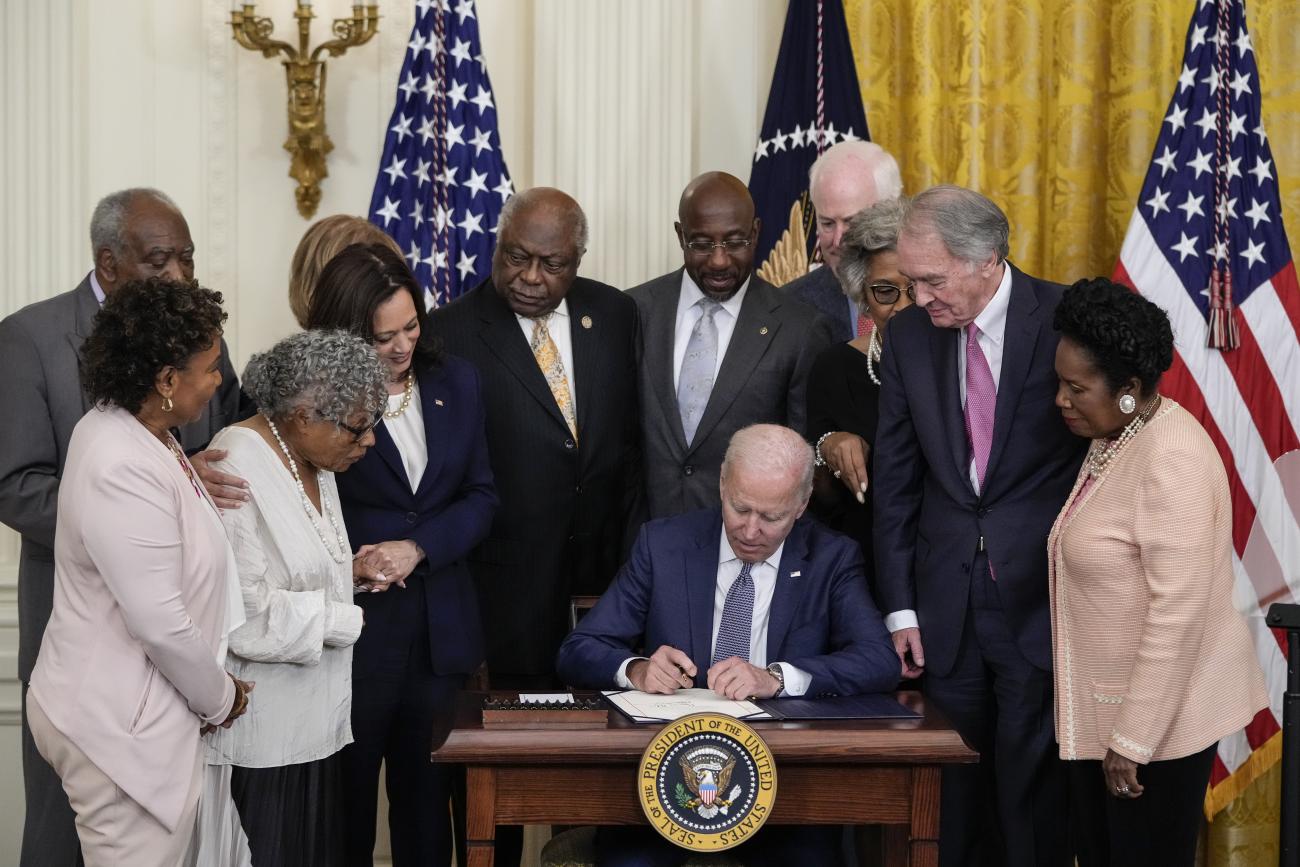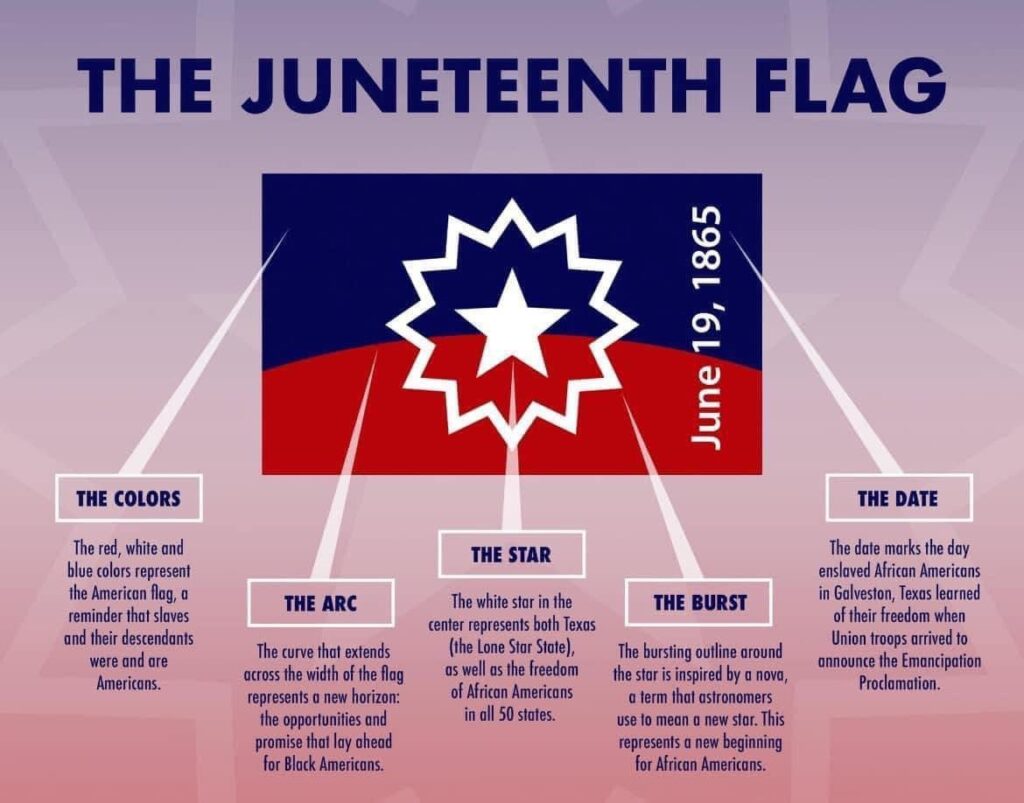Juneteenth: A Celebration of Liberation and a Call for Continued Progress


The Journey to Freedom
“Juneteenth may mark just one moment in the struggle for emancipation, but the holiday gives us an occasion to reflect on the profound contributions of enslaved Black Americans to the cause of human freedom.” —Jamelle Bouie
January 1, 1863, through the clouds of bloodshed and violence created by the Civil War. President Abraham Lincoln emerged with a document named the Emancipation Proclamation where he penned a clear message to the “rebellious” confederate states declaring all enslaved people in confederate territories to be “forever free.” This landmark document marked a turning point in American history, a powerful statement that the institution of slavery would not endure. However, the road from President Lincoln’s legal declaration to the lived reality of Black people in bondage was long and uneven.
Despite the importance of the Emancipation Declaration’s decree, news of the document and its subsequent effects traveled slowly, often carried by word of mouth or through the underground efforts of abolitionists. In addition, for many confederate states, President Lincoln’s proclamation of freedom was simply not enough and the presence and success of Union forces was essential to enforce the document’s mandate. This meant a delayed and geographically disproportionate experience of freedom for enslaved people. While some enslaved people in areas under early Union control received news relatively quickly, others, particularly those in the Confederacy’s most remote corners, endured a longer wait.
The state of Texas, the Confederacy’s westernmost territory quickly became a symbol of this delayed liberation. Due to geographic isolation and the territory’s fierce loyalty to the Confederacy and its ideals, Texas remained largely untouched by the war’s earlier advancements. As a result, enslaved people in Texas continued to labor under forced servitude for over two years after the Emancipation Proclamation’s issuance.
A Reason to Celebrate
Finally, after extreme toil and strife, General Gordon Granger arrived in Galveston, Texas, backed by a substantial Union force on June 19, 1865. His mission was two-fold, transcending a simple military victory; he carried the weight of liberating the final group of black enslaved people in the confederacy. Bringing forth a surge of hope for a future where black people were no longer enslaved chattel, but truly free individuals.
Black communities in Texas swiftly embraced the news of their freedom, adjusting to the major changes now afforded to them and within a year, organizing celebratory gatherings to commemorate their liberation. Initially held in Black churches, celebrations across Texas served as a powerful reminder of freedom. Over time, Juneteenth observances spread throughout the South, carried by formerly enslaved people and their descendants.
The turn of the 20th century brought forth The Great Migration, a mass movement of Black Americans from the rural South to urban centers across the country. As Black people established themselves in places like Chicago, New York, and Los Angeles, Black southerners shared their Juneteenth traditions with their newfound communities effectively spreading the Juneteenth holiday across the country.
Despite its growing popularity and growing geographical reach, Juneteenth remained a cultural tradition only for over a century. Federal recognition of this paramount day in African American history finally arrived on June 18, 2021 with the passage of the Juneteenth National Independence Day Act.
“The day we were free—everyone was free. Why not make it a paid holiday? We deserve that…We want a day that is inclusive to everyone.” —Pharrell Williams
While achieving federal recognition of Juneteenth as a national holiday marks a significant step forward for Black Americans, it would be disingenuous to suggest that liberation from slavery marked the end of the fight for Black freedom.
Continue to Fight the Good Fight
In today’s society, Black Americans have traded the brutality of chattel slavery for the insidious grip of systemic discrimination. As a result, the fight for freedom has evolved into a relentless pursuit for economic empowerment. Through entrepreneurship, homeownership, and generational wealth building, countless individuals within Black communities across the US are actively striving towards the accomplishment of economic freedom.
Though the pursuit of economic freedom for everyone isn’t a monolithic concept, the ultimate goal to not just survive, but thrive and rise is commonplace. The path to achieving this goal varies greatly across the Black community. However, the resounding theme remains the same – to dismantle the economic barriers that have historically held back Black people and create a future of opportunity and self-determination.
So on this Juneteenth it’s important to not only remember and celebrate the past but to continue to fight for the future.
Sources
- Juneteenth World Wide Celebration, https://www.juneteenth.com.
- Dorazio, Justin. “Systematic Inequality.” Center for American Progress, 21 February 2018, https://www.americanprogress.org/article/systematic-inequality
- “ECONOMIC POLICY.” Black Economic Alliance Foundation, https://foundation.blackeconomicalliance.org/app/uploads/2020/07/Black-Economic-Alli ance-2020-Policy-Summary-and-White-Paper.pdf.
- “The Historical Legacy of Juneteenth.” National Museum of African American History and Culture, https://nmaahc.si.edu/explore/stories/historical-legacy-juneteenth.
- “Home > Exhibits > Featured Documents > The Emancipation Proclamation.” National Archives, 28 January 2022, https://www.archives.gov/exhibits/featured-documents/emancipation-proclamation
- “Juneteenth | History, Meaning, Importance, & Facts.” Britannica, https://www.britannica.com/topic/Juneteenth

